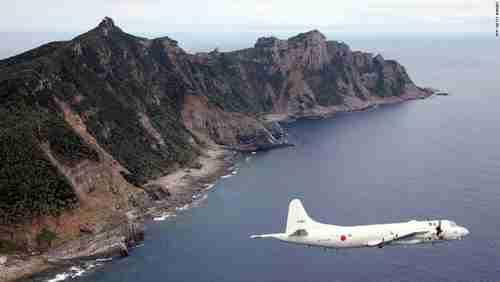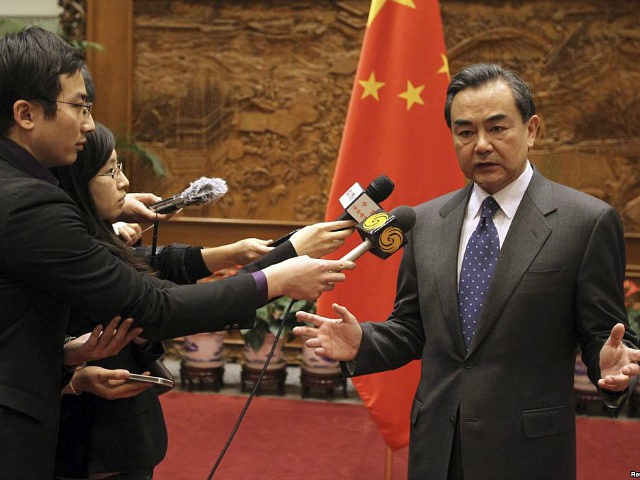This morning’s key headlines from GenerationalDynamics.com
- China sails warships near Japan’s Senkaku Islands
- Tensions rise between China and Trump administration
China sails warships near Japan’s Senkaku Islands

Senkaku Islands
In a show of military force, China sailed three warships past the Senkaku Islands on Monday, just two days after Secretary of Defense James Mattis visited Japan and reaffirmed the US commitment to defend the islands if attacked by China.
Although the Senkaku Islands are just a collection of large, barren rocks, it is believed that they lie in a region with vast oil and gas reserves. Japan says that the islands have been their sovereign territory since the 1800s. China says that they have been their sovereign territory since “ancient times,” and that their claims are “indisputable,” but China says exactly the same things about any other country’s territory that it wants to confiscate. China’s claims in the South China Sea are not only “disputable,” they are also illegal according to a ruling by a United Nations court in the Hague. Some of China’s “ironclad proof” was investigated by the BBC and found to be a hoax.
The United States has taken no position on whether Japan or China own the Senkaku Islands, but have agreed that Japan is currently administering the islands. During the early part of the administration of President Barack Obama, there was some question whether Obama would agree to defend the islands under the US-Japan Treaty of Mutual Cooperation and Security that was signed in 1960. The issue was cleared up in April 2014 during a visit by Obama to Japan, he announced, “The policy of the United States is clear – the Senkaku Islands are administered by Japan and therefore fall within the scope of Article 5 of the U.S.-Japan Treaty of Mutual Cooperation and Security. And we oppose any unilateral attempts to undermine Japan’s administration of these islands.”
The administration of President Donald Trump once again reaffirmed the US defense of the Senkaku Islands last week when ]US Defense Secretary James Mattis visited Japan and said:
I made clear that our long-standing policy on the Senkaku Islands stands — the US will continue to recognize Japanese administration of the islands and as such Article 5 of the US-Japan Security Treaty applies.
China’s Foreign Ministry responded quickly:
Diaoyu [Senkaku] and its affiliated islands have been Chinese territory since ancient times. These are historical facts that cannot be changed. The so-called US-Japan security treaty was a product of the Cold War, and it should not harm China’s territorial sovereignty and legitimate rights…
We urge the US side to adopt a responsible attitude and stop making wrong remarks on the issue of the sovereignty of Diaoyu Islands.
It is getting very tiresome to hear that China always describe their empty claims as indisputable facts, but the real concerns is that the Chinese are becoming so angry and frustrated that they’ll take real military action. Sending three warships near the islands, as they did on Monday, is harmless as far as it goes, but with nationalistic feelings high in both China and Japan, a miscalculation leading to a military clash is a real possibility. CNN and Fox News
Related Articles
- China’s ‘ironclad proof’ of South China Sea claims revealed as hoax (22-Jun-2016)
- Obama says U.S. will defend Japan over Senkaku Islands (24-Apr-2014)
- U.S. fails to reaffirm its mutual defense treaty with Japan (06-Apr-2014)
Tensions rise between China and Trump administration
US-China tensions have been growing steadily for years, especially as China has built illegal artificial islands and illegal military bases in the South China Sea. But these tensions seem to have taken a major spurt since Donald Trump became president, because of Trump’s willingness to go much farther than Obama in challenging “politically correct” norms.
Even before taking office, Trump accepted a phone call from Taiwan’s president Tsai Ing-wen. Tsai has refused to endorse the “one-China policy” that precludes Taiwan’s independence, and Trump has said that the one-China policy is open for negotiation. Younger generations in Taiwan increasingly favor independence, and it’s clear to China that time is not on their side.
Early last month, during his confirmation hearing for Secretary of State, Rex Tillerson said that China’s artificial islands and military bases in the South China Sea were an “illegal” activity and added:
We’re going to have to send China a clear signal that first, the island-building stops and second, your access to those islands also is not going to be allowed.
An editorial in Chinese state media said, “Unless Washington plans to wage a large-scale war in the South China Sea, any other approaches to prevent Chinese access to the islands will be foolish.”
This talk of war has led to some media questions about how ready China is for war.
China has only one aircraft carrier, the Liaoning, but it is much smaller than US aircraft carriers, having been purchased from the Soviet Union in 1988.
The Liaoning can carry up to 24 fighter jets and about 12 helicopters, while U.S. Navy’s current Nimitz-class warships, such as the USS Ronald Reagan, stationed in Japan, can handle more than 60 aircraft. An even larger carrier, the USS Gerald Ford, will be put into service in 2017.
That would indicate that China is far behind the United States in sea power, but the first of two new all-Chinese aircraft carriers, the Shandong-1, is expected to begin sea trials this year.
People frequently point out to me that China would not attack the United States because the US has a superior military. From the point of view of Generational Dynamics, that makes sense for most wars, but not for generational crisis wars. When America’s South attacked Fort Sumter, launching the American Civil War, it was predictable that the North would win because it was three times as big, but the South attacked anyway. When Japan attacked Pearl Harbor, it was predictable that America would win because it was five times as big, but Japan attacked anyway.
As a population, China is in a highly emotional state right now. They have become extremely nationalistic. Their younger generations are looking for action, believing that China is strong enough to beat the US. On the US side, most people believe that President Trump means business in a way that President Obama never did, and that Trump may well take some military action to fulfill Rex Tillerson’s threat to prevent China from accessing its artificial islands in the South China Sea.
Generational Dynamics predicts that the US and China are going to war. It’s impossible to predict what will trigger that war, or when it will begin. But whether it begins next month, next year, or thereafter, it will be part of the greatest world war in history. VOA and The Diplomat and The Statesman
Related Articles
KEYS: Generational Dynamics, Japan, Senkaku Islands, China, U.S.-Japan Treaty of Mutual Cooperation and Security, Jim Mattis, Rex Tillerson, Taiwan, Tsai Ing-wen, Liaoning, Shandong-1, USS Ronald Reagan, USS Gerald Ford
Permanent web link to this article
Receive daily World View columns by e-mail

COMMENTS
Please let us know if you're having issues with commenting.